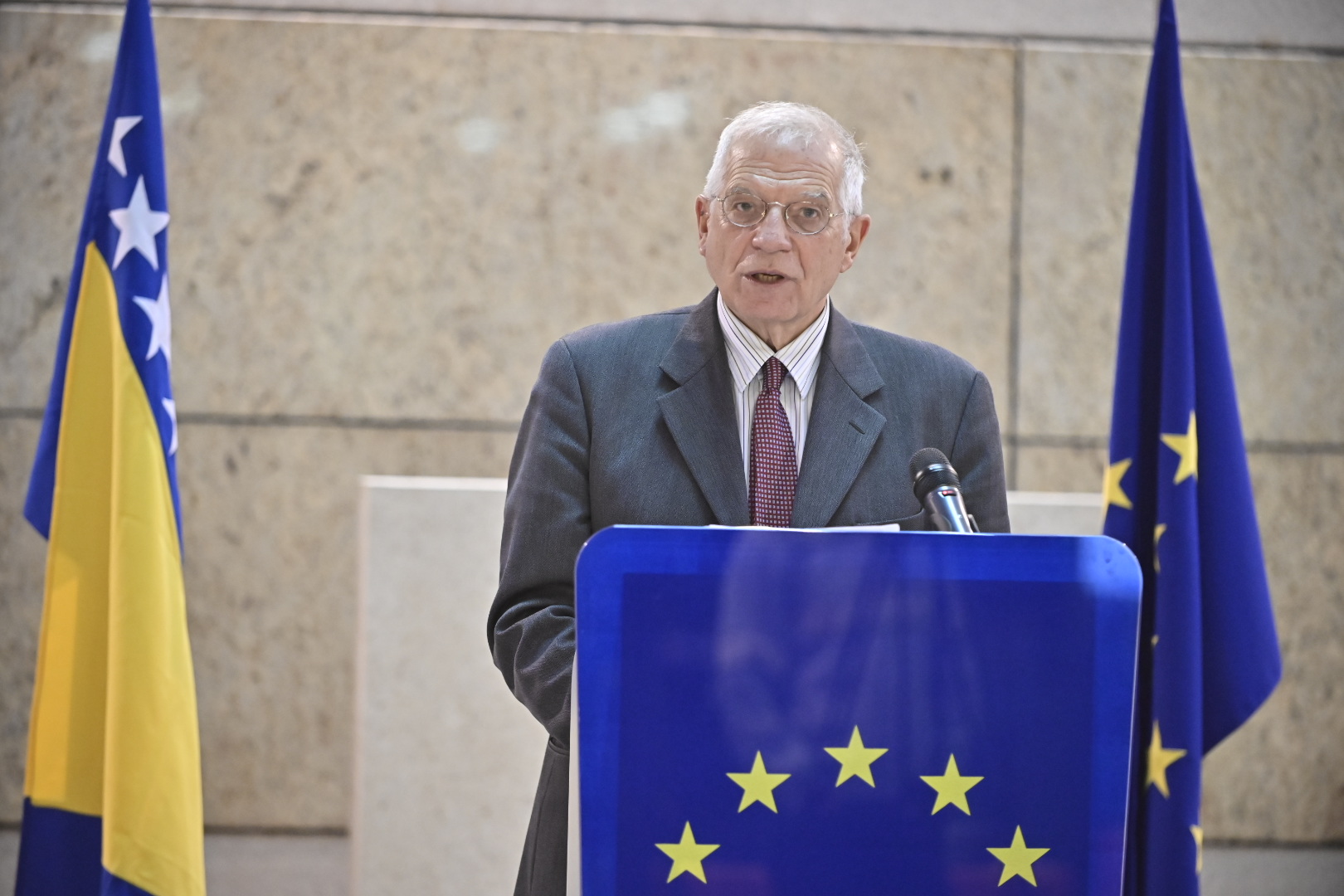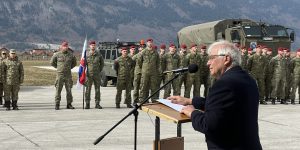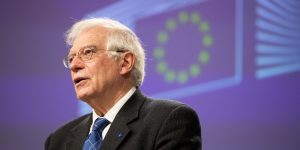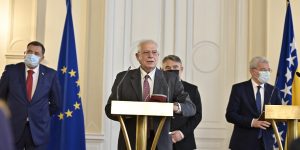Check against delivery!
Ladies and Gentlemen, your excellences, dragi prijatelji,
Today marks a crucial milestone. 25 years have passed since the end of the devastating war in Bosnia and Herzegovina. Yet, its wounds are still visible today.
We remember the tragedies of the past with the promise to never let them happen again – and to celebrate the will and capacity to live peacefully together. And also the will to build a better future, together.
Today during my visit in Sarajevo I would like to share a message which is two-fold: First that the future of Bosnia and Herzegovina lies in the European Union. This is our common goal and commitment. To achieve this objective, the political leadership of this country will have to take its share of responsibility. To enact the reforms that this country needs.
We don’t have lessons to give but maybe we can share some of our experience in order to help. And the help is much needed because the situation is serious on multiple fronts. It is decisive time to take action now.
Let me explain what I mean and why.
This country full of churches and mosques has always played a prominent role in the history of Europe. For centuries, this country has been the point where East and West meet and blend. It has been the border of two religions and two empires. Where a mosque’s call for prayer is in harmony with the ringing of church bells, while a synagogue stands beside them. Marks of three religions that for years were able to live in peace, like in my country in Spain, in the city of Toledo.
This cultural plurality gives an enormous strength. It is a wealth. But for those who want to keep divisions alive, it can be twisted into a weapon.
History has taught us that divisions can be misused and become toxic. 25 years ago, it turned neighbours into enemies. Families were torn apart and childhood friends were taking up arms against each other. It has happened many times in many places in the course of the history. This was not a single case but it was an awful one.
In a way, the EU and Bosnia and Herzegovina are twins. We are founded on the same values of reconciliation and came into being around the same time. In 1992, the EU succeeded to become the then European Communities, and [in the same year] Bosnian citizens voted by referendum for independence.
Just like the founders of Europe, I know that many here in Bosnia and Herzegovina saw strength in diversity. Our motto in the EU is “united in diversity”. The unity does not prevent the diversity and the diversity is not obstacle to the unity. On the contrary, if you unite in diversity you become stronger. And the people were inspired by the optimism spreading across the continent in the early 1990s. They worked hard to build a country on the narrative that it would eventually join the EU. That is clearly still the goal.
There is another link between us as well. From its beginning, the European Union has been a project aimed at overcoming the tragedies of the past. One of these tragedies started here in this city. Another tragedy followed and the continent almost committed a suicide. We Europeans killed each other, destroyed each other, we had sewn death and hatred, but we have been able to overcome these tragedies, reconcile and build unity.
We have been able to create peace, stability and prosperity across the European continent that has been full of blood and death for centuries. It is for all these reasons that we say that bringing the Western Balkans into the EU is essential to complete the peace on the continent.
I know that becoming member of the EU remains a key objective for the country – more than 80 per cent of citizens support this purpose. This will unite Bosnian political parties and the general public alike in a common endeavor – pursuing a goal that is shared by such an impressive amount of people.
Over the past 25 years, progress has been made in many fields towards building a stable and democratic Bosnia and Herzegovina. But at the same time we have to recognise that the journey is not over and a lot remains to be done.
During all this time, the EU stood by Bosnia’s side. This was not only about financial support or ‘technical’ advice, but also showing presence during the hardest moments of the conflict. This presence is still here, I just visited the barracks of Eufor that remains here in order to help stability of the country. This presence includes my own country, Spain. I remember very well that a first solider killed in action on a mission outside Spain was here in Sarajevo when they were coming with humanitarian help for the population.
This remains in the past. We have to recall it but let’s look to the future, for which we all have responsibilities to move forward. To face the future much work still remains [to be done]. Governments and political leaders need to deliver better for their people. And people expect their elected representatives to do so.
Here in Bosnia and Herzegovina, as elsewhere in the region, deep-rooted political divides, shortfalls in the justice system, corruption, and persistent negative rhetoric continue to block progress. We have to recognise that unfortunately it is still like this.
Citizens – and I have been talking with some of them – do not understand why their future is held back by political and administrative weaknesses with their roots in the past when they want to be projected in to the future.
They have a wider view going beyond Bosnia and Herzegovina and beyond the region. Also thanks to the digital world and visa liberalisation they can move, watch, they know what is happening beyond their borders. Their expectations are high and they need to be met.
Failure to deliver on reforms will not only slow the path to the EU. People will continue to vote with their feet, and leave the country. Five percent of the population have already done it.
Today 25 years ago, the Dayton Peace Agreement gave this country a complex governance set-up. A set-up that requires coordination and cooperation among and across the governance structure of Bosnia and Herzegovina and it requires a political will.
With a real political will, you can make anything work. But too often we see political infighting and impasse. Let’s use this anniversary to be a turning point, to move from post-war to pre-accession. To accelerate the process and to move from Dayton to Brussels. This is the journey that this society wants to do.
For that the reform of the institutional and legal framework is needed – transforming the Dayton architecture into one that provides a foundation for a functioning society based on principles of democracy and the protection of human rights – this has to be inclusive, and this will require time and a broad national debate.
As I said, we do not have lessons to give, but maybe some experience to share.
My own country, Spain, is an example of a decentralized state where people with different identities have been able to overcome the legacy of an awful civil war and 40 years of dictatorship. This was often a hard and painful process, with nationalists and divisional conflicts – the scars of which are still there today. But we overcame it. How did we do this transformation? Let me say few words about it.
We adopted the democracy, we reconciled from a civil war whose winner had been in power for 40 years and we joined the EU. We adopted the democracy almost overnight, all political parties were legalised, elections were held, constitution was written and voted on. This was a big achievement because it was a compromise of the two sides who fought the war.
Reconciliation was the most important step towards our future. We decided that the best thing to do was an amnesty. Maybe some escaped the justice, I am not saying that it was the best thing to do, I am just saying what we did. And seven years after Franco’s death a bunch of Socialist won the elections and it became an obsession to become a member of the EU. I remember very well how many transformations we had to do in order to become a member of the EU.
It took almost 15 years of waiting and in the meantime we did a comprehensive plan to change our society [based] on the European perspective. The reconciliation became almost a by-product of the busy work that we had to do in order to become fully European.
Many thousands died in our civil war but the reconciliation was done and our income per capita was growing and we closed the gap to Europe. I think that by doing that we made the biggest transformation in our modern history: school, hospitals, roads, tribunals …all that makes a country a good place to live. And that is, dear friends from Bosnia and Herzegovina, something that you can do if you want and I am sure you want. If you have the political will, you will succeed.
The EU will remain at your side. The EU is an integrator of diversity, reconciliator of past enemies, the EU helps peace and brings prosperity. But the requirement for EU membership includes a well-functioning democracy, strong rule of law and upholding of individual fundamental rights. These requirements not only help strengthen and protect your country’s cultural, ethnic and religious pluralism. They also help citizens, businesses and civil society.
The road you have ahead is clear. The European Commission Opinion’s 14 key priorities endorsed by the Council in December last year provide a roadmap setting out the reforms needed towards EU accession.
It is not going to be easy. The reforms needed are deep and they must make the country’s governance more effective. They will at some point need to include changes to the institutional and electoral frameworks, including at constitutional level where necessary. But only with determination and fulfilling these tasks Bosnia and Herzegovina can advance on the European path – by showing its determination to advance these tasks. This is in the hands of the political leaders of this country and they must show ownership of the needed change.
Be sure that the EU’s engagement and solidarity is real and visible for all who want to use it. We offer support both politically and financially. For example, our new Economic and Investment Plan for the region includes up to 9 billion euros of grants and guarantees aiming to mobilise up to 20 billion euros in investments. Together with the Green Agenda for the Western Balkans, it will help the long-term economic recovery of the region through better connectivity and transition to a green and digital economy.
This will not only help foster regional convergence but also help the Western Balkans get closer to the EU single market.
But boosting investment and economic growth will only be possible if it is coupled with the implementation of fundamental reforms based on European values. They are essential to create an environment favourable to entrepreneurship, job creation and sustainable investment.
Ladies and gentlemen,
The rejection of conflict, hate and division, acceptance of cooperation and reconciliation is central to the European Union and to our values. And so it is for Bosnia and Herzegovina and its people.
The EU is a project for peace and for people. Yet history shows that reconciliation is a process not an event. It is not something that happens overnight. It takes time and every day work that needs to be reaffirmed, persistently, every day.
What we expect from aspiring members of the Union is to engage in this continuous process of reconciliation. There are three different types of political process where you find among the politicians blamers who spend their time blaming others for their problems. You find commentators that just explain things but take no action. And you find doers – people who act, who react, who transform, create institution, political will, cohesion, unity.
Bosnia and Herzegovina has to find this way – the way of positive creation, way of doing, having ambitions, having prospect to become – as many of us before you – a place where political freedom, economic prosperity and social cohesion are landmarks of stabilisation. That is my message: everything is possible. And EU is there to help and I hope that we can do it together.
Let’s make good use of this 25 years from Dayton, from the moment when war stopped and a fragile peace started. The peace is still fragile, not complete, in the spirit and in the memories of people.
There is a big, an enormous political challenge for all of you to win. And in this battle to win the future the EU will be on your side. My visit here, my presence her on this very special day is aimed at sending this message to all of you: your future is on the way to Europe. But your future has to be built by yourself, by no one else. You will have to do it but we can help. Thank you and good travel to Europe!
Watch the video here:




